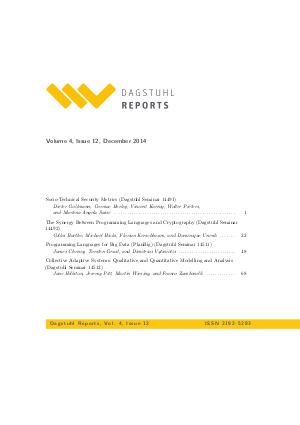Dagstuhl Reports, Volume 4, Issue 12
-
Part of:
Volume:
Dagstuhl Reports, Volume 4
Journal: Dagstuhl Reports (DagRep)

Event
- Dagstuhl Seminars 14491, 14492, 14511, 14512
Publication Details
- published at: 2015-03-20
- Publisher: Schloss Dagstuhl – Leibniz-Zentrum für Informatik
- DBLP: db/journals/dagstuhl-reports/dagstuhl-reports4
Access Numbers
- Detailed Access Statistics available here
-
Total Document Accesses (updated on a weekly basis):
0PDF Downloads
Documents
Dagstuhl Reports, Volume 4, Issue 12, December 2014, Complete Issue
Abstract
Cite as
Dagstuhl Reports, Volume 4, Issue 12, Schloss Dagstuhl – Leibniz-Zentrum für Informatik (2015)
Copy BibTex To Clipboard
@Article{DagRep.4.12,
title = {{Dagstuhl Reports, Volume 4, Issue 12, December 2014, Complete Issue}},
journal = {Dagstuhl Reports},
ISSN = {2192-5283},
year = {2015},
volume = {4},
number = {12},
publisher = {Schloss Dagstuhl -- Leibniz-Zentrum f{\"u}r Informatik},
address = {Dagstuhl, Germany},
URL = {https://drops.dagstuhl.de/entities/document/10.4230/DagRep.4.12},
URN = {urn:nbn:de:0030-drops-50099},
doi = {10.4230/DagRep.4.12},
annote = {Keywords: Dagstuhl Reports, Volume 4, Issue 12, December 2014, Complete Issue}
}
Dagstuhl Reports, Table of Contents, Volume 4, Issue 12, 2014
Abstract
Cite as
Dagstuhl Reports, Volume 4, Issue 12, pp. i-ii, Schloss Dagstuhl – Leibniz-Zentrum für Informatik (2015)
Copy BibTex To Clipboard
@Article{DagRep.4.12.i,
title = {{Dagstuhl Reports, Table of Contents, Volume 4, Issue 12, 2014}},
pages = {i--ii},
journal = {Dagstuhl Reports},
ISSN = {2192-5283},
year = {2015},
volume = {4},
number = {12},
publisher = {Schloss Dagstuhl -- Leibniz-Zentrum f{\"u}r Informatik},
address = {Dagstuhl, Germany},
URL = {https://drops.dagstuhl.de/entities/document/10.4230/DagRep.4.12.i},
URN = {urn:nbn:de:0030-drops-50081},
doi = {10.4230/DagRep.4.12.i},
annote = {Keywords: Dagstuhl Reports, Table of Contents, Volume 4, Issue 12, 2014}
}
Socio-Technical Security Metrics (Dagstuhl Seminar 14491)
Abstract
Cite as
Dieter Gollmann, Cormac Herley, Vincent Koenig, Wolter Pieters, and Martina Angela Sasse. Socio-Technical Security Metrics (Dagstuhl Seminar 14491). In Dagstuhl Reports, Volume 4, Issue 12, pp. 1-28, Schloss Dagstuhl – Leibniz-Zentrum für Informatik (2015)
Copy BibTex To Clipboard
@Article{gollmann_et_al:DagRep.4.12.1,
author = {Gollmann, Dieter and Herley, Cormac and Koenig, Vincent and Pieters, Wolter and Sasse, Martina Angela},
title = {{Socio-Technical Security Metrics (Dagstuhl Seminar 14491)}},
pages = {1--28},
journal = {Dagstuhl Reports},
ISSN = {2192-5283},
year = {2015},
volume = {4},
number = {12},
editor = {Gollmann, Dieter and Herley, Cormac and Koenig, Vincent and Pieters, Wolter and Sasse, Martina Angela},
publisher = {Schloss Dagstuhl -- Leibniz-Zentrum f{\"u}r Informatik},
address = {Dagstuhl, Germany},
URL = {https://drops.dagstuhl.de/entities/document/10.4230/DagRep.4.12.1},
URN = {urn:nbn:de:0030-drops-49744},
doi = {10.4230/DagRep.4.12.1},
annote = {Keywords: Security risk management, security metrics, socio-technical security, social engineering, multi-step attacks, return on security investment}
}
The Synergy Between Programming Languages and Cryptography (Dagstuhl Seminar 14492)
Abstract
Cite as
Gilles Barthe, Michael Hicks, Florian Kerschbaum, and Dominique Unruh. The Synergy Between Programming Languages and Cryptography (Dagstuhl Seminar 14492). In Dagstuhl Reports, Volume 4, Issue 12, pp. 29-47, Schloss Dagstuhl – Leibniz-Zentrum für Informatik (2015)
Copy BibTex To Clipboard
@Article{barthe_et_al:DagRep.4.12.29,
author = {Barthe, Gilles and Hicks, Michael and Kerschbaum, Florian and Unruh, Dominique},
title = {{The Synergy Between Programming Languages and Cryptography (Dagstuhl Seminar 14492)}},
pages = {29--47},
journal = {Dagstuhl Reports},
ISSN = {2192-5283},
year = {2015},
volume = {4},
number = {12},
editor = {Barthe, Gilles and Hicks, Michael and Kerschbaum, Florian and Unruh, Dominique},
publisher = {Schloss Dagstuhl -- Leibniz-Zentrum f{\"u}r Informatik},
address = {Dagstuhl, Germany},
URL = {https://drops.dagstuhl.de/entities/document/10.4230/DagRep.4.12.29},
URN = {urn:nbn:de:0030-drops-50045},
doi = {10.4230/DagRep.4.12.29},
annote = {Keywords: Security, Theory, Languages}
}
Programming Languages for Big Data (PlanBig) (Dagstuhl Seminar 14511)
Abstract
Cite as
James Cheney, Torsten Grust, and Dimitrios Vytiniotis. Programming Languages for Big Data (PlanBig) (Dagstuhl Seminar 14511). In Dagstuhl Reports, Volume 4, Issue 12, pp. 48-67, Schloss Dagstuhl – Leibniz-Zentrum für Informatik (2015)
Copy BibTex To Clipboard
@Article{cheney_et_al:DagRep.4.12.48,
author = {Cheney, James and Grust, Torsten and Vytiniotis, Dimitrios},
title = {{Programming Languages for Big Data (PlanBig) (Dagstuhl Seminar 14511)}},
pages = {48--67},
journal = {Dagstuhl Reports},
ISSN = {2192-5283},
year = {2015},
volume = {4},
number = {12},
editor = {Cheney, James and Grust, Torsten and Vytiniotis, Dimitrios},
publisher = {Schloss Dagstuhl -- Leibniz-Zentrum f{\"u}r Informatik},
address = {Dagstuhl, Germany},
URL = {https://drops.dagstuhl.de/entities/document/10.4230/DagRep.4.12.48},
URN = {urn:nbn:de:0030-drops-50055},
doi = {10.4230/DagRep.4.12.48},
annote = {Keywords: Programming languages, databases, data-centric computation, machine learning, cloud computing}
}
Collective Adaptive Systems: Qualitative and Quantitative Modelling and Analysis (Dagstuhl Seminar 14512)
Abstract
Cite as
Jane Hillston, Jeremy Pitt, Martin Wirsing, and Franco Zambonelli. Collective Adaptive Systems: Qualitative and Quantitative Modelling and Analysis (Dagstuhl Seminar 14512). In Dagstuhl Reports, Volume 4, Issue 12, pp. 68-113, Schloss Dagstuhl – Leibniz-Zentrum für Informatik (2015)
Copy BibTex To Clipboard
@Article{hillston_et_al:DagRep.4.12.68,
author = {Hillston, Jane and Pitt, Jeremy and Wirsing, Martin and Zambonelli, Franco},
title = {{Collective Adaptive Systems: Qualitative and Quantitative Modelling and Analysis (Dagstuhl Seminar 14512)}},
pages = {68--113},
journal = {Dagstuhl Reports},
ISSN = {2192-5283},
year = {2015},
volume = {4},
number = {12},
editor = {Hillston, Jane and Pitt, Jeremy and Wirsing, Martin and Zambonelli, Franco},
publisher = {Schloss Dagstuhl -- Leibniz-Zentrum f{\"u}r Informatik},
address = {Dagstuhl, Germany},
URL = {https://drops.dagstuhl.de/entities/document/10.4230/DagRep.4.12.68},
URN = {urn:nbn:de:0030-drops-50066},
doi = {10.4230/DagRep.4.12.68},
annote = {Keywords: Collective Adaptive Systems, Qualitative and Quantitative Modelling and Analysis, Verification, Humans-In-The-Loop}
}